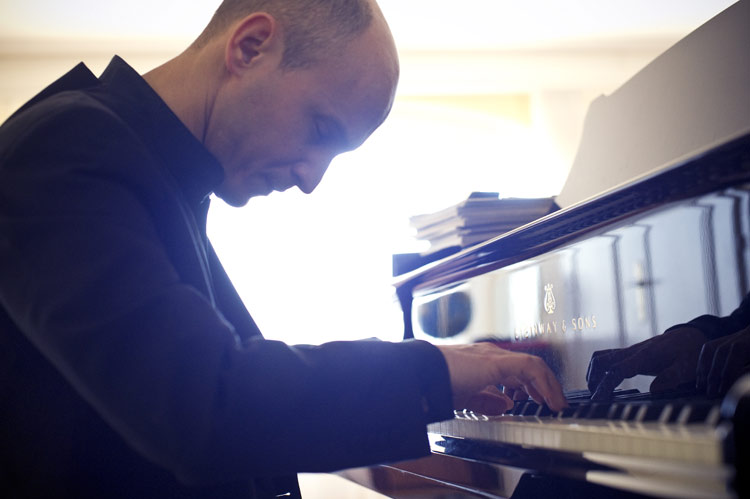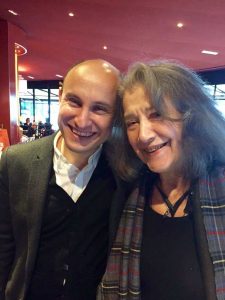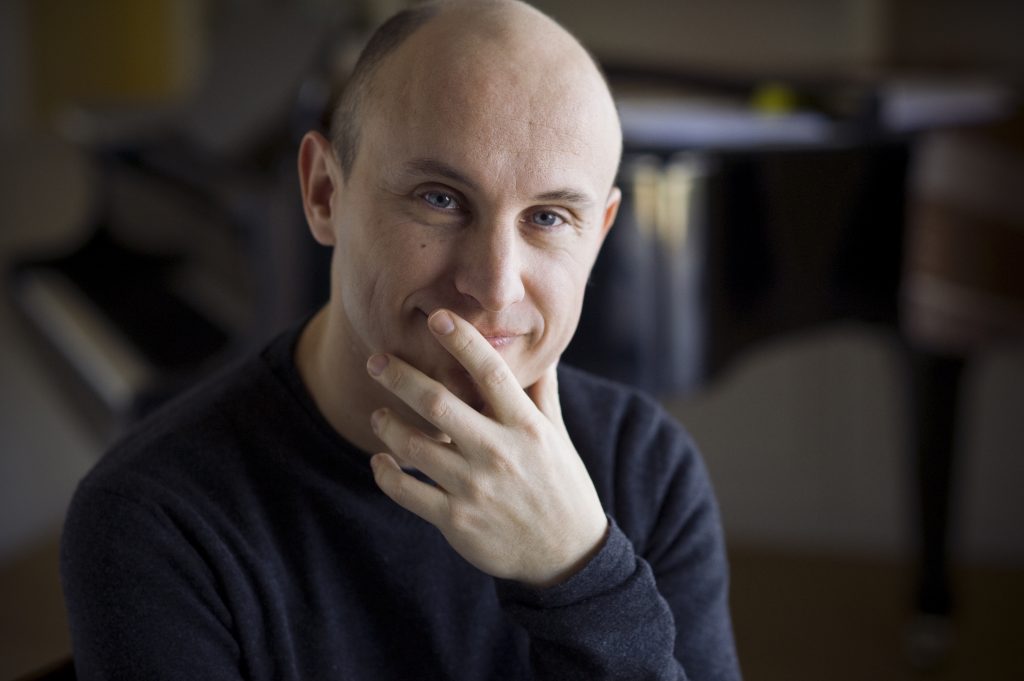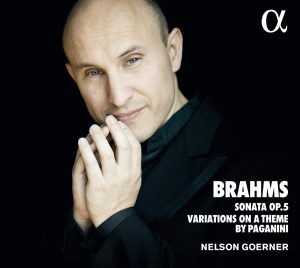Nelson Goerner – Exploring the depths
Nelson Goerner is a sort of ‘rare bird’ on the concert platform. Each of his concerts is a unique experience. His most recent CDs featuring major works by Brahms, Godowsky and Paderewski are simply breathtaking. Eric Schoones met him in Groningen to discuss his recordings, his views on his artistry and about Maria Tipo, with whom he studied.

Goerner grew up in San Pedro, a small town near Buenos Aires. He was a prodigy who taught himself to read and write before he was three years old. When he was seventeen he played for Martha Argerich and, with her help, gained a scholarship in Europe. On her advice he went to Maria Tipo, by then already a legend, for further instruction. He won the Concours de Genève and eventually even took over Maria Tipo’s class at the Conservatoire de Musique de Genève. At the invitation of Daniel Barenboim he recently also taught for two years at the Barenboim-Said-Akademie in Berlin. But Nelson Goerner’s focus is primarily on giving concerts – much to the delight of his audiences.
– Maria Tipo wasn’t unknown in Argentina.
– No, she was an icon, and played everywhere – not just in Buenos Aires. When I took my entrance exam in Geneva, I immediately felt that something incredible awaited me.
– She was a very demanding teacher.
– (laughs) Very much so; all of her students were reduced to tears at some point. She was enormously critical, also of herself, and was rarely satisfied with her playing. She really liked teaching, and never forgot an appointment. We spent a lot of time together, and she really took care of her pupils. After teaching for hours she would then go and practise herself. Generous as she was; she let me play one of her concerts because, despite winning the prestigious Geneva competition, I had very few opportunities to perform at first. My career was slow to get started. She knew it would take a while before I got a proper engagement in Italy, and that’s why she let me take her place.

Nelson Goerner and Martha Argerich
– Quite unlike the teachers who alienate their pupils from concerts.
– Yes, I’d like to stress that. She put in an appearance at the concert, and also made the arranger aware that she hadn’t cancelled because she’s received a better offer or because she wanted to be rid of it. It was a most unusual thing to do. I played Beethoven’s ‘Hammerklavier’ Sonata. She was very exact about the structure, the context and the dynamic construction of the fugue. Above all it shouldn’t sound like a stunt. She was a very natural pianist; just watching her play was a lesson in itself. She had an incredible legato, like a great singer, and her use of the pedal was quite extraordinary – all the critics wrote about it. She combined sonorities in a magical, very unorthodox way. ‘You have to stroke the keys’, as her mother Ersilia Cavallo always said, who had studied first with a pupil of Rubinstein and later under Busoni. Her sound was never hard or aggressive, the way you often hear today, and that’s insufferable. Listen to her Scarlatti recordings, which made her famous at a stroke in 1955. So refined – they’re really dances, and she doesn’t imitate the harpsichord, but uses all the potential of the piano, with taste, character and imagination. Every sonata has its own character.
– When I listened in on your rehearsals yesterday, I was struck by the way you work with sound relationships within a chord, between melody, bass and middle parts.
– Yes, it’s hard to make a chord sing; the balance between the various voices is so important; you train your fingers, but you train your ears even more. Ultimately you can achieve unbelievable things even on a mediocre piano, and I try to develop this sensitivity to sonority in my pupils as well.
– Your most recent CD include music by Paderewski, Godowsky and Brahms. Can you discern the pianist behind the composer?
– Always, and especially in the case of pianists like Godowsky who had such an all-encompassing technique. Paderewski was a fabulous pianist as well. His recording of his own Nocturne, Op. 16 No. 4 – which I have recorded too – is incredible, but I also admire La leggierezza by Liszt and the F minor Variations by Haydn greatly. Likewise, for instance, Grieg’s Ballade and Chopin’s Études played by Godowsky.
– You say that Godowsky was always nervous at recordings.
– Yes, unfortunately there aren’t any recordings of him in large-scale works, but that applies to many artists. I never heard Arthur Rubinstein in person, but some of his live recordings give an idea of what he sounded like in real life, and I find this immediacy slightly lacking in his studio recordings.
– Therefore the recently discovered recording by Rachmaninov is also so stunning.
– Exactly, he wasn’t aware that he was being recorded. The idea that something was being set down for all eternity made him nervous too. But a recording is just a snapshot in your development.

‘I’ve already been living with Brahms’s
Third Sonata for 25 years.’
– Is that why you perform the programme of your CDs in concert first?
– Absolutely, it’s essential – not the other way around in order to sell more CDs! A CD is the result of a long process of study, searching for the meaning of every note – a process that continues in concerts too – where, if you feel at ease on stage, you find out a lot that doesn’t become apparent when practising at home. It’s the only way. I’ve already been living with Brahms’s Third Sonata for 25 years – half my life. It’s such an incredible piece; it contains everything – power, drama, youthful optimism. Brahms was still young, but already in possession of all his faculties. Moreover it’s also very original for its time.
– And still – not every recording is the result of such a long process.
– No; I played Paderewski’s Variations and Fugue on an Original Theme at the request of the Chopin Institute, where I’m a member of the advisory board, and it was love at first sight. I love playing Paderewski’s Piano Concerto, but the Variations are more profound, in a certain sense enigmatic, psychologically very multi-faceted, and the fugue is grandiose. People see Paderewski as a miniaturist, but this is something wholly different. I hope that in a modest way I can contribute to the fame of these Variations.’
– And the feeling of freedom during a concert?
– Yes, I try to achieve that in the studio too, but it’s very difficult, because at a concert you’re sharing the music with hundreds of people. That’s a very special feeling. For that reason I make as many live recordings as possible. In the studio you’re searching more for an ideal.
– Is there such a thing?
– At a specific moment, yes, but the concept keeps on developing, and that’s why I don’t like listening to my own recordings.
– At the rehearsal yesterday I noticed how a single note can clarify the structure of a piece, so that unexpected dimensions arise.
– I learned that from the great pianists such as Josef Hofmann and Ignaz Friedman. They reveal the psychological content of the music in such an immediately recognizable way, without losing their personalities and without placing their own egos in the foreground. Just recently I heard Josef Hofmann in Chopin’s Fourth Ballade. So extreme, individual and overwhelming, with a demonic power, intense lyricism, and completely in Chopin’s spirit. His pupil Shura Cherkassky was recently a role model for me in this respect.
– Many would regard it as a gamble to play Brahms’s Paganini Variations in concert.
– (laughs) And so it is. They’re notoriously difficult, but their virtuosity is not that of Liszt, who was also a performer in the best sense of the word. He makes some concessions to the taste of his time, when the piano gained its place as the king of instruments. I am totally against the view – often still encountered today – that Liszt was superficial; but unfortunately many pianists still go for superficial virtuosity.
– The same is actually true of Rachmaninov.
– You shouldn’t play the Third Concerto like a big show. Listen to Rachmaninov himself; he has so much grandeur, and it’s so noble, so rich and also so emotional. He never displays his technique for its own sake. It’s impossible to deny the truth of this role model.
– You have no time for great extravagance.
– I have learned to avoid it completely – a very important point, because it keeps you away from the real meaning of the music. You can see with the really great pianists: they don’t try to seduce the audience with grand gestures, for example. If you do that, you’re more concerned with yourself, and less with the music. Consciously or unconsciously – both are bad. I also see it as one of my duties as a teacher to make genuine talents aware of this. You must approach the music from within, I don’t decide anything from the externals. It remains an eternal quest – otherwise you just turn into a copy of yourself.
Recent Albums
Brahms: Sonata, Op. 5; Variations on a Theme by Paganini, Op. 39. Alpha Classics 557

Paderewski: Variations and Fugue; Godowsky: Künstlerleben. Narodowy Instytut Fryderyka Chopina, NIFCCD 061
Author: Eric Schoones
More about Nelson Goerner: www.nelsongoerner.com
This article is a contribution from the German and Dutch magazine Pianist through Piano Street’s International Media Exchange Initiative and the Cremona Media Lounge.
 Pianist Magazine is published in seven countries, in two different editions: in German (for Germany, Austria, Switzerland, Luxemburg and Liechtenstein) and in Dutch (for Holland and Belgium).
Pianist Magazine is published in seven countries, in two different editions: in German (for Germany, Austria, Switzerland, Luxemburg and Liechtenstein) and in Dutch (for Holland and Belgium).
The magazine is for the amateur and professional alike, and offers a wide range of topics connected to the piano, with interviews, articles on piano manufacturers, music, technique, competitions, sheetmusic, cd’s, books, news on festivals, competitions, etc.
For a preview please check: www.pianist-magazin.de or www.pianistmagazine.nl
Comments
“I never heard Arthur Rubinstein in person, but some of his live recordings give an idea of what he sounded like in real life, and I find this immediacy slightly lacking in his studio recordings.”
Absolutely agree! I love Rubinstein and am intimately familiar with his records, both live and studio. The difference is night and day. You can tell it’s the same pianist but his live recordings are absolutely electric. His studio recordings are very noble and polished but lose some of that crackling energy.